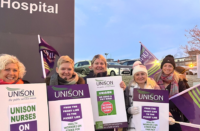As a solution to the housing, rent and homelessness crisis we need a massive public housing plan, with both new construction and the conversion of NAMA property into public housing.
The advantages of public housing to working people are many. It would not just resolve the present crisis—a national emergency on any sober reflection—but also strengthen communities and the working class.
“Social housing” is defined generally as housing provided by government agencies or non-profit organisations for people on low incomes or with particular needs. In Ireland it is specifically defined by the state as housing provided by a local authority or a housing association to people who cannot afford housing from their own resources.
Property rented or leased from the private sector by local authorities or voluntary housing bodies is now also included in Ireland’s social housing sector. So, in essence, the Irish definition of social housing allows a private-sector space, and can create a dependence by the state on the private sector, as the state ultimately doesn’t own the houses. This creates vulnerability.
Unlike the Continent, Ireland’s renting from private landlords was seen as short-term leases with no long-term rights for tenants, mainly for students, and entirely at the discretion of the landlord. Rented accommodation was almost entirely furnished accommodation, and usually of a very low standard.
While this has changed in recent times, rented accommodation still carries this hostile attitude socially. And while there has been recent legislation guaranteeing some rights to tenants, the law is heavily loaded in favour of landlords. Throughout the EU the rights of tenants who previously enjoyed protection have been deregulated, with the “market” deciding the availability and rights of tenants.
Social housing is specifically aimed at low-income people or those who cannot afford it through the “normal” market mechanisms. Public housing, on the other hand, is housing owned by the state and available for rent. It can be aimed at all and should be made available to all as a right. Any person should have the right and choice to rent from the state in a long-term and secure way if they do not wish to become indebted to, and live at the mercy of, the banks and the finance industry.
The advantages of public housing include:
- Quality homes are made available for rent from the state in a long-term and secure way
- Housing is de-financialised
- It is provided as a right for all and as an option for all
- It reduces workers’ dependence on banks and lenders
- It reduces household indebtedness, leading to an increase in workers’ militancy and industrial action
- There is less fear or risk of eviction for working people and their families.
These are just some of the advantages of a public housing solution. While costly to the state, it is—as right2change recently stated—a political choice, and the right political choice for working people.





